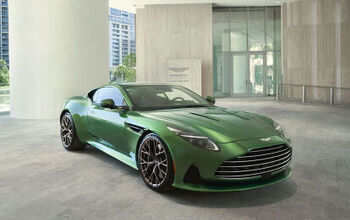North American 2025 Volkswagen ID. Buzz versus the 2024 German-Market Model: What are the Differences?

The new all-electric Volkswagen ID. Buzz just debuted in North America. If you’re in the market for a new van that can also do double-duty as a camper, you may want to pay attention. Although this adventure-mobile has just been released here, my husband, Andy Lilienthal, and I spent nearly three weeks with one in Europe. Let’s look at the 2025 North American-spec Volkswagen ID. Buzz versus the early-2024 rear-wheel-drive German-market model we had overseas. We’ll dissect comparative stats, differences, and impressions of both.
No matter what VW ID. Buzz trim level you may get, is it long-distance road trip worthy even though it’s an EV? Yes. At least with careful planning (we put nearly 5,000 miles on our German-market ID. Buzz Pro) when we competed in the 2024 Baltic Sea Circle Rally (BSCR) with one.
(Full disclosure: Volkswagen of America paid for my flight, hotel, and meals so I could drive the 2025 North American-spec Volkswagen ID. Buzz in San Francisco, California.)
After an excruciatingly long wait, the hotly anticipated VW bus’s official debut is here. How would it compare to the famed T2 Microbus of the 1950s and beyond? I flew to California to attend Volkswagen’s first-drive event to see how the North American (NA) ID. Buzz EV differed from our German counterpart and what remained the same. Though they’re technically the same model, there are several differences when comparing the two markets. Keep in mind, Europe also now gets the long-wheelbase version, but still gets a short-wheelbase model. We in NA will only get the longer variant.
The German-made model, which Andy previously wrote about, was a short wheelbase derivative versus the long wheelbase North American type we’re getting. The SWB ID. Buzz is 9.9-inches shorter in length than the longer NA model.
2025 North American long-wheelbase ID. Buzz:
- Three rows
- 195.4 inches long
- 127.5-inch wheelbase
- 76.2 inches tall and 78.1 inches wide without mirrors
Early-gen 2024 German short-wheelbase ID. Buzz:
- Two rows
- 185.5 inches long
- 117.6-inch wheelbase
- 76.2 inches tall and 78.1 inches wide without mirrors
Both model types carry lithium-ion batteries, though our German-made ID. Buzz Pro had an 82-kWh battery and a maximum 170kW on DC power and AC charging power of 11kW. Our German-market short wheelbase EV had much lower horsepower than its mid-year 2024 refreshed sibling. Ours came in at 201 HP and in mid-year 2024, was updated to 282 HP. The NA version goes right to 282 horsepower for the long wheelbase rear-wheel drive models and a maximum horsepower of 335 for its 4Motion all-wheel-drive iterations—both far more than our German rally van. The RWD iteration has 413 lb-ft of torque and the 4Motion AWD derivative has 413 lb-ft of torque to the rear and 99 lb-ft to the front. That’s VW’s lingo to define the AWD’s torque, FYI.
The US and Canadian-market models further up the power potential with a 90-kWh battery and a maximum of 200kW on DC power. The AC charging potential remains the same as our German rally van. The early-gen 2024 German models are said to have up to 250 to 263 miles of range (402 to 423 kilometers), according to testing done by the WLTP or Worldwide Harmonized Light Vehicle Test Procedure. The North American models have an EPA-estimated range for 234 miles for RWD models; 231 miles for 4Motion AWD models.
After 36 total rally charges and extensive analysis of our real-world statistics, our ID. Buzz Pro netted a wide array of total kilometers after charging to 100 percent. They ranged from below the stated range to higher than anticipated numbers.
For example, we got 250 miles or greater (over 400 kilometers) 13 times during the BSCR. However, about the same number of charges garnered less than 217 miles (350 kilometers) per charge. The rest of our 36 charges fell between the two.
Our rally van garnered a whopping 290 miles (467 kilometers) on a 100 percent charge after 38 minutes in Molde, Norway. We arrived with 57 percent battery left and 169 miles (272 kilometers) left before we connected. That was our highest mileage total after charging to 100 percent. On the lowest end, we got just 180 miles (290 kilometers) on an 80 percent charge, which took us 31 minutes to complete. We arrived with only 14 percent battery left and 30.4 miles (49 kilometers) left before charging. This was in Helsingborg, Sweden.
The German VW ID. Buzz Pro was estimated to have a thirty-minute charging session from 5 percent to 80 percent SOC (state of charge). This was if you DC charged at the maximum 170kW. This was accurate compared to our rally figures. Note: The North American-spec ID. Buzz ups the DC receipt rate to 200kW vs. our rally ID. Buzz at 170kW. Figuratively speaking, it should charge faster if you find ultra-fast chargers with charge rates more than 170kW than our Deutsch-made runner.
The NA 2025 Volkswagen ID. Buzz EV will arrive in the U.S. late 2024. It will be available in three trims: Pro S, Pro S Plus, and a launch-only 1st Edition model. Both rear-wheel-drive or 4Motion all-wheel-drive configurations will be available. The launch-only 1st Edition starts at $65,495 MSRP for RWD and $69,995 MSRP for the 4Motion AWD iteration, with a $1,550 destination fee tacked on top. The NA ID. Buzz’s Pro S model starts with an MSRP of $59,995, with the Pro S Plus beginning at $63,495, minus destination.
The 2025 4Motion AWD Volkswagen ID. Buzz was remarkably fun to drive. With its power and handling, it surprisingly stuck like glue. The ID. Buzz was a hoot in curvy roads and easily passed other vehicles on the interstate. The RWD version is entertaining to drive as well but doesn’t quite have the throttle response for ear-to-ear grins the AWD version offered. Both NA versions had plenty of power and spacious cabins filled with USB-C outlets. There’s also one optional AC outlet located under the passenger’s seat (I wish it was in another place as I kept accidentally knocking my device’s cords out of the plug), as well as a 12-volt outlet in the rear that’s only available when the ID. Buzz is on. It’d be helpful to have another 12-volt outlet up front to power DC-outfitted devices like our Garmin Tread GPS system.
It’s also nice if the 12-volt outlet was on all the time to power things like fridge/freezers when traveling. Our German market one was constantly on. However, we learned it may have been modified to do so. We got confirmation that it’s a simple and common fuse modification to always keep it on. Note: This update may have been done on the early-gen 2024 ID. Buzz we competed with so we could keep our fridge in our QUQUQ camper system running.
The NA ID. Buzz boasts a 12.9-inch central infotainment display as well as a 5.3-inch driver’s screen. This includes a newer ID.4 tech software system and larger screen than what our early-2024 German-spec model. Volkswagen’s latest software lets you manage the van’s IQ.DRIVE advanced driver assistance technology, as well as a bunch of other things to keep you connected and safe at all times. The NA Pro S Plus and 1st Edition trims also showcase a heads-up display, as a standard feature. However, with my shorter height (5’-4”), I was only able to see the upper-most part of the display. I couldn’t see if it was modifiable to make it show higher on the windscreen, either.
The NA long-wheelbase interior is extremely spacious, no matter if you have captain’s chair or a bench seat as the middle row of this three-seater. Perhaps that’s due to the extra 9.9-inches of length in the rear compared to our rally van. I hoped a display ID. Buzz in San Francisco would feature the QUQUQ interior camping setup we used in our rally van, but alas, there wasn’t one. I wanted to see how much more room it’d have in the rear and center section with the added length vs. the short-wheelbase version we had overseas.
VW is offering NA customers eight colorful two-tone and three single-tone exterior options (in Candy White, Metro Silver, or Deep Black Pearl). Three interior color selections are also available: Copper, Moonlight (with dark brown seats and royal blue accents), and Dune (light ivory and orange tidbits). Not sure why both German-spec and NA models include a light cream/ivory interior, especially for the seats as tiny hands and dirt will be a challenge to keep them clean.
The 2025 ID. Buzz EV is undoubtedly a head-turner. Every iteration I drove was engaging, fun, and stylish. While some may not like its looks or that it’s an EV, I think it’s paying great homage to the T2 Transporter (e.g. Microbus) of yore and is a solid van to consider, no matter if you have a family or plan to convert it into a campervan.
[Images © 2024 Mercedes Lilienthal/TTAC.com]
Become a TTAC insider. Get the latest news, features, TTAC takes, and everything else that gets to the truth about cars first by subscribing to our newsletter.

Mercedes Lilienthal is an Oregon-based automotive journalist and photographer who contributes to The New York Times and several automotive outlets like Car and Driver, Forbes, Autoblog, and more. Additionally, she is a Feature Editor of OVR Magazine. Mercedes creates content involving vehicular adventure travel, the automotive industry, and inspiring women within it. She and her husband own two customized right-hand-drive turbo diesel 4x4 Mitsubishis: A Delica Space Gear van and a Gen 2 Pajero SUV. They also own two modified Subaru daily drivers.
More by Mercedes Lilienthal
Latest Car Reviews
Read moreLatest Product Reviews
Read moreRecent Comments
- ToolGuy Tim said climate change is real, so I don't think this will ever apply to me.
- Arthur Dailey Always liked these. One of Nissan's last 'extra base hit' vehicles? Can't remember ever seeing a shifter worn as much as the one on this vehicle.
- Arthur Dailey Agree with above that it is amazing how the seat seems to be in such good condition. Wonder if it is a replacement? The phot of the GM horizontal 'clacking' speedo brings back lots of memories. After a certain amount of wear and tear, at low speeds the needle would 'clack' back and forth. Seems that the odometer has probably been around twice based on the location of the digit on the far left. Personally I am not a big fan of the GM 305 engine, as it seemed to be a compromise between durability and performance and therefore wasn't 'great' at either.
- Alejandro I had one, in forest green back in 2000. First brand new car. Wheel bearings issues aside, the truck was relatively bullet proof. Plus it had that super handy first aid kit, that was always ready to be used in the wilderness of Dallas traffic. I miss that truck.
- Jeff I remember these I haven't seen one in decades. Ford is rumored to be coming out with a new Ranchero but I doubt it will be like the old ones. Probably be a 4 door crew cab with a short bed.











































Comments
Join the conversation